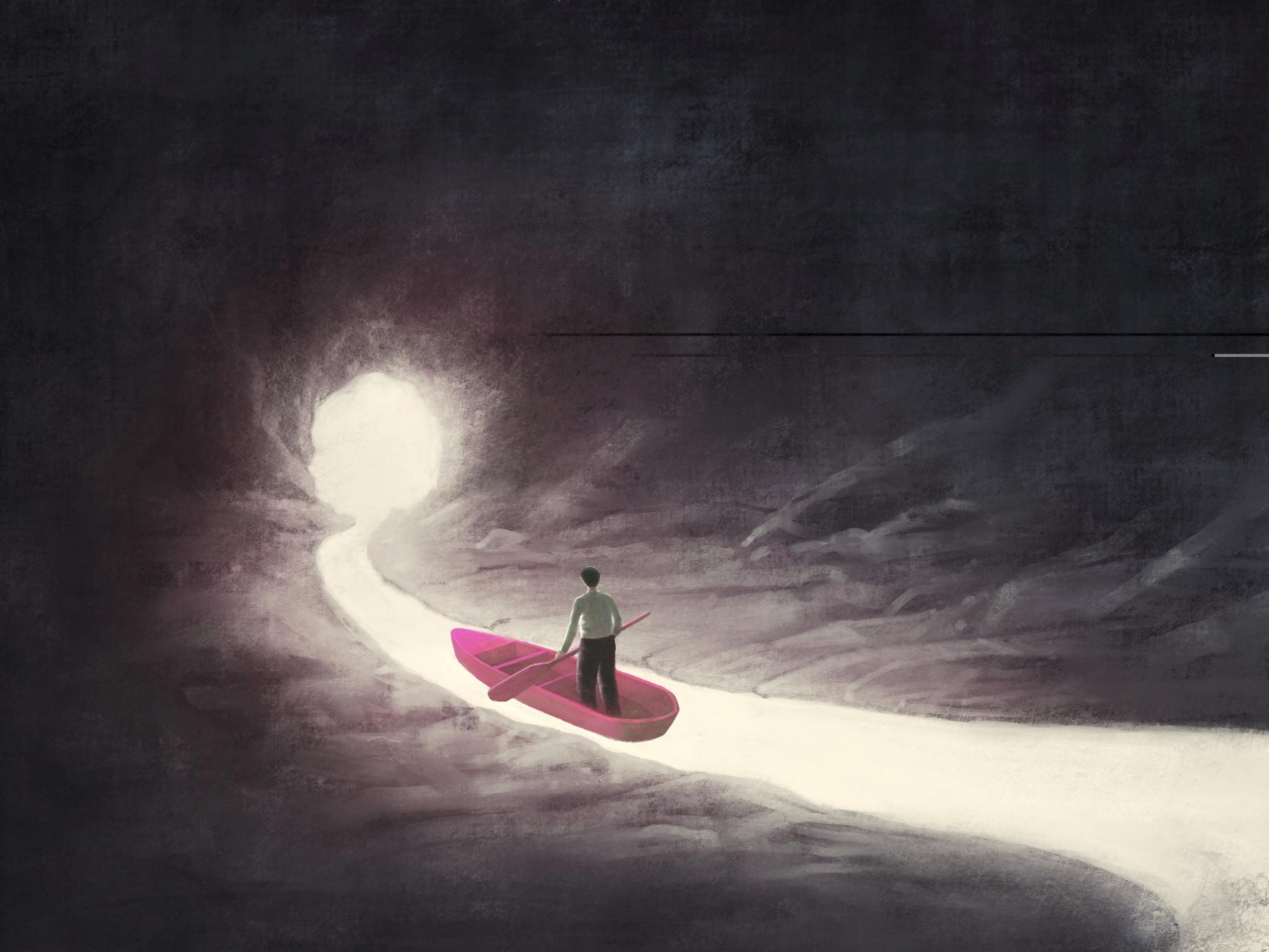Sober in a pandemic: How lockdown helped people quit drinking
Concerns that lockdown would cause an increase in drinking have been well reported, but Natasha Preskey finds that not everyone has drunk more. Some found it the perfect time to leave the bottle behind


This was meant to be an exciting year for Paul. At the start of 2020, when coronavirus was just another news headline, he bought a new car, moved into a bigger house and started a new job. He was looking forward to holidays and gigs with friends to celebrate his 40th birthday later in the year, and his drinking habits were similar to many other people that work 9-5. “I’d get to Friday and relax with a few beers and cocktails, have a few more on Saturday, then hair of the dog on Sunday,” the 40-year-old from Doncaster tells The Independent.
But, when lockdown started, Paul – who was still in his probationary period – lost his new job as a mortgage broker with just a week’s notice. His income immediately wiped out, he took a job as a packer at an Amazon warehouse. A week later, his old employer offered to rehire him on furlough, as long as he didn’t work elsewhere. “I sort of sat on my arse for a few days after that and drank – the weather was beautiful,” he recalls. “I bought a 40-pack of Stella and thought ‘this’ll last me for the three months I’m furloughed’... within two days, it’d gone.”
Paul compares the drinking he did over the next three weeks to an all-inclusive holiday that quickly lost its fun. “It’s a bit depressing really, drinking on your own,” he says. “It’s just me and the dog, so it was just us two, getting pissed on a daily basis.” Like people across the country, his birthday plans were cancelled, and he soon had little to look forward to.
At the end of March, it was reported that supermarkets had seen a 22 per cent rise in alcohol sales. Paul was left feeling low after his initial few weeks of daily drinking and decided he’d had enough. He found a Facebook group run by Club Soda, a movement that promotes “mindful drinking”, and received messages of support from hundreds of people after he posted about his decision to give up drinking.
Paul hasn’t drunk alcohol for 11 weeks now, starts a new job on Monday and feels determined to stay sober once lockdown eases. “I just feel amazing. I feel like anything is possible,” he says, adding that he’s been exercising regularly, has cut down on takeaways and is doing online courses. “I thought it was going to be a bit of a grim experience turning 40 on my own with everything cancelled, but it’s just been so good. It’s been such a good turning point.”
During lockdown, many feared that a combination of isolation, stress and boredom would lead the nation into dangerous drinking habits. In May, an editorial for the British Medical Journal warned that the pandemic could trigger “increased alcohol harm for a generation”. While the data available so far suggests that many of us are drinking more – a series of surveys analysed by the Institute for Alcohol Studies reported that between a fifth and a third of people had been drinking more in lockdown – that isn’t the whole picture. The surveys also looked at people drinking less and found an equal or greater amount of people had actually cut down.
I just knew that I had to quit alcohol because it would have sent me over the edge, probably to the point of no return...
Fiona Walker, a doctoral researcher at Sussex University surveying Brits about their lockdown drinking habits, tells The Independent that, so far, 48 per cent of her respondents have reported drinking more, while 18 per cent say they’re drinking less. Walker says a large proportion of those cutting back are in the 16-24 age bracket. “The feedback that I’ve had from some participants is ‘I only really drink with friends and I don’t drink at home’,” she says. Many of those who have reported drinking more are older, she adds, offering parents who might use alcohol to de-stress from homeschooling as one example.
Lucy is experiencing the polarising effect lockdown has had on drinking habits. The 30-year-old previously had a “negative relationship” with alcohol as a result of mental health issues caused by growing up around gang violence. Around two years ago, she cut down her drinking and, when lockdown began, the mum-of-three took a decision to stop completely. “I just knew that I had to quit alcohol because it would have sent me over the edge, probably to the point of no return,” she says. “Being locked down drinking constantly, I decided that wasn’t a good idea.”
However, in her job as a youth worker, Lucy has also seen the opposite effect of lockdown in action. She says many of the young people she works with have been drinking more, out of boredom. “Even in lockdown, they were still meeting up, hanging on the estates and drinking,” she explains. “When we’re seeing these unlicensed raves in the estates, everyone’s drinking alcohol and socialising, they’re all using alcohol to cope.”
Lucy is frightened about the pubs reopening this weekend and fears the effects a second spike and another lockdown could have both on her and the vulnerable young people she works with. “That could possibly tip me over the edge, and thousands of other people,” she says.
I’ve not had a bad time, but I’ve not really felt the need to drink...
Laura Willoughby, co-founder of Club Soda, has been working with the hospitality industry during lockdown to encourage pubs to offer the biggest possible range of low-alcohol and alcohol-free drinks when they reopen. “A lot of people will be more conscious of the fact that they can’t socially distance if they’re pissed, and so there will be a group of people who will be changing their drinking habits,” she says. She has observed that many people that previously drank socially, but not at home, have chosen to cut down or totally stop drinking.
Jack Hadaway-Weller, 26, who lives near Tunbridge Wells, gave up drinking for Dry January but ended up staying sober throughout lockdown too. “I had quite a few big festivals planned this year but, because I haven’t done any of that, I’ve just carried it on,” he explains. “I’ve done a few pub quizzes online where people are drinking, but it doesn’t really work for me. I’ve not had a bad time, but I’ve not really felt the need to drink.”
For those who have a problematic relationship with alcohol, however, lockdown can complicate, rather than simplify, their feelings around drinking. Many of the traditional support systems for people recovering from problem drinking or alcoholism are based around peer support. “Part of the ethos of Alcoholics Anonymous is the group fellowship,” Dr Bob Patton, lecturer in clinical psychology at the University of Surrey, tells The Independent. “If you take that away, it can be problematic for those who’ve become used to that way of coping.”
Dr Patton says many of what previously would have been church hall-style meetings have gone online but points out that not everyone has access to, and is familiar with, this kind of technology.
Cath*, 40, who went into recovery from alcoholism earlier this year, was worried about the impact that losing peer support would have on her during lockdown. Additionally, she found herself unable to visit her children, who she had voluntarily placed into foster care while she recovered, as they live with a person vulnerable to Covid-19.
Though being limited to just video calls with her toddlers has been “dreadful”, Cath says she has been able to quickly adapt to the online versions of her 12-step meetings. “It has been a time of healing for me, it’s been a much quieter, much simpler, restorative, recuperative time,” she says, adding that her children will be returning to live with her in September.
I know I won’t feel tempted. This is a lifestyle change for me, not just a lockdown thing...
While Cath doesn’t believe her experience of lockdown is typical, she does point out that there are benefits in being able to access alcohol support services in a new way. “Not that I have, but were I to be struggling around my recovery in the middle of the night, I could log on anywhere in the world to a fellowship meeting.”
For Zoëliza Harkin, lockdown was the period when she accessed therapy for the first time to address her worries about her relationship with drinking. Initially, after losing one of her two jobs in lockdown, she began drinking again after nine weeks of sobriety. But, once she started phone therapy, her resolve was strengthened. “Coming out of lockdown, I feel like a completely different person,” she says. “I know I won’t feel tempted. This is a lifestyle change for me, not just a lockdown thing. When the bars open, I’ll not be going to any of them.”
For those who do return to pubs, Dr Bob Patton is optimistic that some of the safety measures in place could help them sustain a more measured approach to alcohol. “Some of the things that might have encouraged us to drink more than we should in the past – like getting involved in buying rounds – I think they’re going to be impacted,” he says.
Dr Patton expects that, despite fears about “Super Saturday”, pubs won’t be “like Bournemouth beach”. “It’s going to be table service, it’s going to be ordering through apps,” he says. “It’s kind of like Sunday lunch rather than Friday night.”
*Name has been changed
For advice and information about drinking and drug use, or to find support services, visit wearewithyou.org.uk
Join our commenting forum
Join thought-provoking conversations, follow other Independent readers and see their replies
Comments